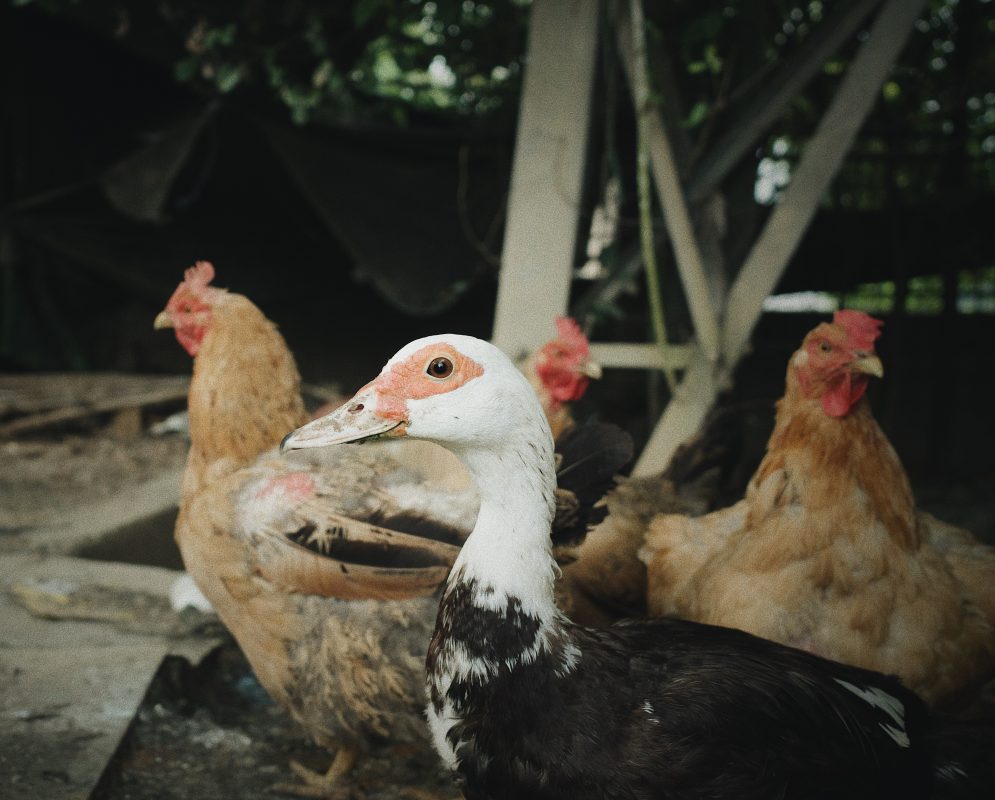As an age-old debate rages on, the question of which bird is more intelligent – ducks or chickens – remains as relevant as ever. Many have often asked, “Are Ducks Smarter Than Chickens?”
Like two sides of a coin, the comparison between these two species can be seen from many viewpoints.
To better understand this complex issue, let us take a closer look at the cognitive abilities of these feathered creatures and find out which one is smarter.
Key Takeaways
- Ducks have unique cognitive abilities and behaviors, relying on problem-solving and pattern recognition for foraging strategies.
- Ducks demonstrate a range of cognitive abilities, including memory recall, tool usage, and vocal communication.
- Chickens exhibit sophisticated cognitive abilities, including problem-solving, communication, and social organization.
- Both ducks and chickens display complex thought processes and demonstrate the ability to learn and adapt to their environments.
Understanding Bird Intelligence: A Brief Overview
Bird intelligence is typically studied and measured through learning techniques, communication styles, environmental influences, aging factors, and domestication effects.
Various research methods, such as problem-solving experiments, are used to understand the level of problem-solving capabilities of birds. By observing communication styles and learning techniques, scientists can measure the intelligence of birds.
In addition, aging factors and domestication effects can be used to measure the learning ability of birds. Environmental influences also play a role in bird intelligence, as birds that live in diverse environments often have higher cognitive abilities than those living in more limited environments.
Ultimately, by understanding the intelligence of birds, scientists can better comprehend the differences between chickens and ducks.
Insight Into Duck Cognition and Behavior
Although ducks have been observed to display intelligence comparable to chickens, they have been found to possess unique cognitive abilities and behaviors that set them apart.
Ducks are well-known for their foraging strategies, which rely heavily on their ability to problem-solve and recognize patterns.
They are also quite adept at communication, utilizing a range of vocalizations and body language to communicate within their flocks.
Ducks also have distinct habitat preferences compared to chickens, often being found in aquatic and marshy areas in addition to land.
Lastly, ducks often form complex social structures within their flocks, displaying intricate dynamics demonstrating their intelligence.
Overall, ducks are fascinating creatures with a level of intelligence that should not be underestimated.
The Cognitive Abilities of Chickens
Chickens can exhibit sophisticated cognitive abilities, including problem-solving, communication, and social organization. Studies have shown that chickens possess foraging habits, mating rituals, and predator avoidance strategies that require complex thought processes.
Furthermore, chickens have been observed to use vocal communication to communicate with one another and navigate their environment. Additionally, chickens have been demonstrated to possess navigational skills, allowing them to find their way around their environment easily.
Exploring Research Studies on Duck Intelligence
Research studies have revealed that ducks display a range of cognitive abilities and may even be more intelligent than chickens in certain areas.
Ducks have been observed to use foraging tactics to find food and demonstrate impressive memory recall when remembering where food is located. They are also known to use tools to access food and can solve complex problems to obtain food.
In terms of communication, ducks are reasonably adept at using vocalizations to communicate with each other and have been observed to use different calls in different contexts.
These cognitive abilities suggest that ducks may be more intelligent than chickens in certain areas.
Investigating Scientific Findings on Chicken Intelligence
Regularly, chickens demonstrate sophisticated cognitive abilities that suggest they may be just as intelligent as ducks. In terms of animal learning, chickens can be trained to communicate through a variety of signals and to understand cause-effect relationships.
Regarding brain anatomy, the avian brain is similar to that of a mammal, though much smaller, and chickens have complex neural pathways. Avian communication can be seen in chickens responding to various sounds, such as their own species’ alarm calls and the presence of predators.
Chickens have been observed using tools and manipulating objects to reach desired outcomes, showing their problem-solving abilities. Social interaction is also seen in chickens, indicating that they can form social hierarchies and recognize individuals.
Ultimately, these scientific findings indicate that chickens are highly intelligent animals and may be on par with ducks.
Comparing The Intellectual Capacities of Ducks and Chickens
Although chickens and ducks demonstrate impressive cognitive abilities, which species is more intelligent still needs to be determined.
To investigate this question, various scientific studies have explored various topics, from foster parenting to evolutionary biology, diet differences, temperament traits, and social networks.
Research suggests that chickens have greater problem-solving abilities, but ducks adapt better to their environment. Chickens are also more likely to remember the location of food and can make decisions based on social cues.
On the other hand, ducks can recognize other ducks and may even exhibit greater intelligence in specific tasks.
Overall, it is difficult to definitively determine which species is smarter than the other, as both exhibit impressive intellectual capabilities.
Real-Life Observations and Anecdotes
Observing ducks and chickens in their natural environment provides interesting anecdotes of their intellectual capabilities. Foraging habits, social interaction, food preferences, nesting behavior, and habitat selection are all indicators of their intelligence.
Ducks are generally observed as more independent than chickens and are more likely to search for food independently. Conversely, chickens are more likely to forage in groups and take cues from one another. Additionally, ducks tend to be more selective in food choices, while chickens are less discriminating.
Ducks also prefer to nest in more secluded areas than chickens, and they are known to possess a greater ability to recognize areas of safety and potential danger. Overall, these observations suggest that ducks may be more intelligent than chickens.
Implications for Poultry Farming and Pet Ownership
Due to their higher intelligence and independence, the implications of duck farming and pet ownership should be carefully considered.
Socializing poultry, for example, may be more complex and time-consuming than with chickens.
Regarding health benefits, ducks may require different diets and more space to exercise.
Ethical considerations, such as the potential for cognitive distress in ducks and chickens when kept in small cages, should also be considered.
Cost analysis is also necessary, as ducks may require more resources than chickens.
Frequently Asked Questions
Are Ducks and Chickens Suitable as House Pets?
Ducks and chickens are both suitable as house pets, depending on the owner’s preferences. It’s interesting to note that ducks are considered to be much quieter than chickens, with chickens making up to five times more noise than ducks.
Regarding housing requirements, ducks can adapt to various living situations, while chickens typically require larger areas with outdoor access.
Feeding preferences are also different, with ducks preferring watery and protein-rich foods, while chickens are omnivores that enjoy a variety of fruits and vegetables.
When it comes to playfulness, ducks are generally more active, while chickens can be content to stay in one place.
Grooming needs are also different, with ducks needing to be monitored more often for parasites and other health concerns.
What Is the Best Diet for Ducks and Chickens?
The best diet for ducks and chickens depends on a variety of factors.
Free-range chickens and ducks typically forage for various food sources, such as insects, seeds, and plants. In addition, they may need additional feed such as grains and other supplements.
Housing requirements should also be considered when determining the best diet for these animals, as they need adequate space to move around and exercise.
Breeding habits should also be taken into account, as different breeds of chickens and ducks may require different diets.
Ultimately, the best diet for ducks and chickens should provide them with various feed sources and an environment that encourages their natural foraging behavior.
How Do Ducks and Chickens Respond to Training?
Training ducks and chickens can be quite the feat. Ducks are often much more vocal and have a greater urge to learn than chickens. Their intelligence is remarkable, as they can quickly learn intricate training methods.
However, chickens have a different approach to learning. They require more patience and repetition but can still learn as effectively as ducks. The key is to understand the vocal and behavioral differences between the two, and then tailor the training methods to suit the respective species.
How Do Ducks and Chickens Interact With Other Animals?
Ducks and chickens have different foraging habits. They usually prefer to feed in water, while chickens feed mainly on the ground.
Ducks also tend to have different habitat preferences. They prefer to live in wetlands and other aquatic areas. In contrast, chickens typically live in terrestrial areas.
When it comes to social behavior, ducks are more social. They will gather in larger groups than chickens, who are more solitary and territorial.
Ducks also tend to vocalize more than chickens, who are typically quieter.
Regarding health needs, both ducks and chickens require a balanced diet and regular checkups from a veterinarian.
How Much Space Do Ducks and Chickens Need to Thrive?
Do ducks and chickens need the same amount of space to thrive?
Generally, they have similar requirements for housing and free-ranging, although ducks tend to require more water and access to a pond or lake.
Ducks also need feed that is high in protein and fat, while chickens can have a more varied diet.
Socialization opportunities can also differ – ducks usually do better around other ducks, while chickens can sometimes be comfortable living alone.
Conclusion
In conclusion, the intellectual capacities of ducks and chickens are comparable, yet ducks may have slightly more advanced cognitive abilities.
Moreover, ducks are better suited to problem-solving, while chickens display more social behavior.
Ultimately, this suggests that ducks and chickens may be better suited to different roles in poultry farming and pet ownership.
This further demonstrates the importance of understanding the unique intelligence of different bird species.

